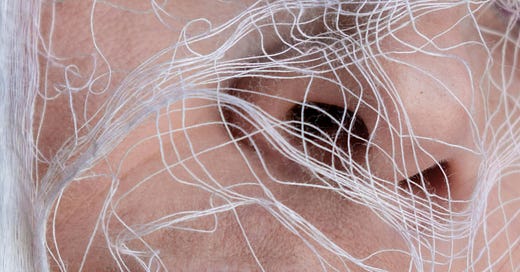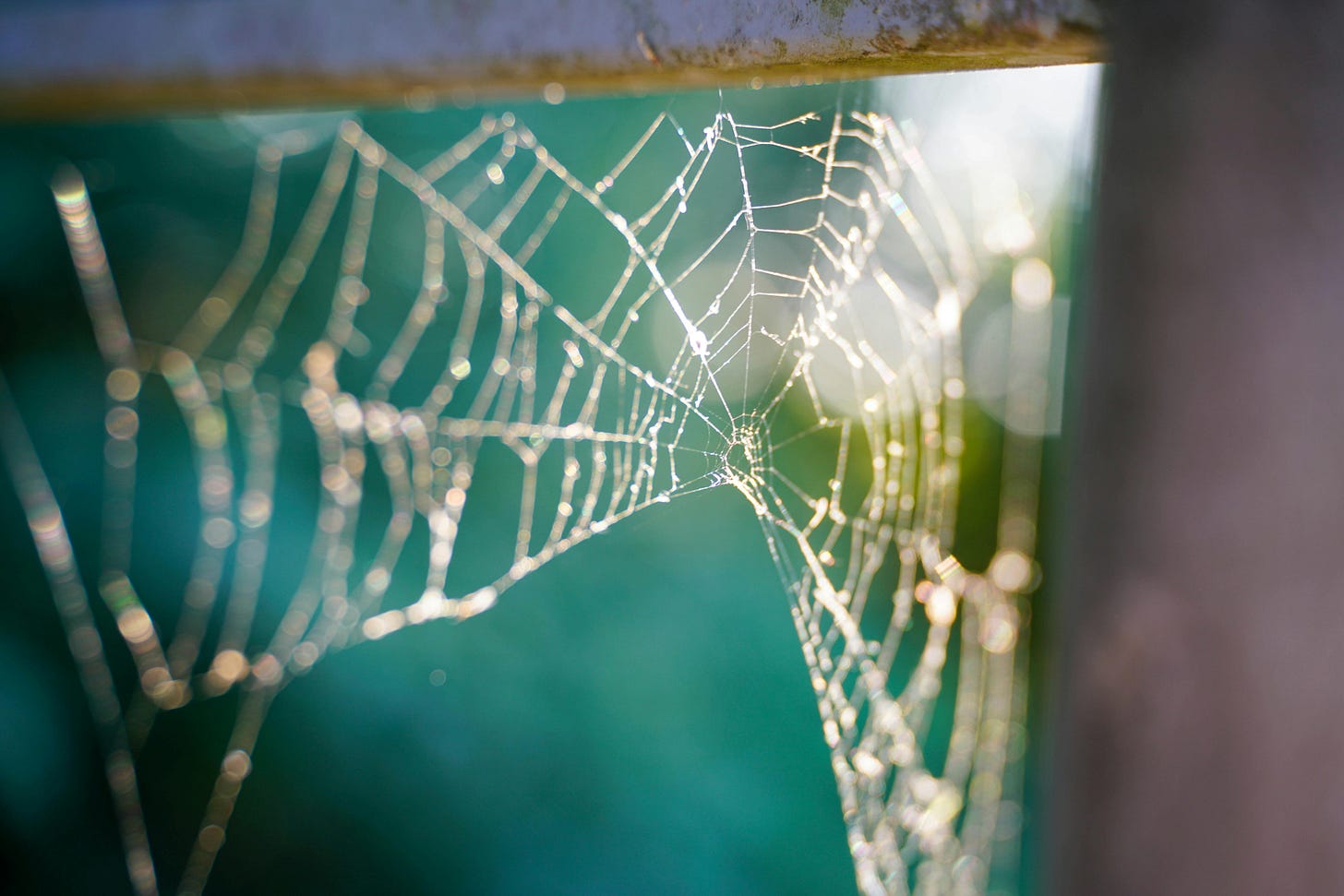What We Fear Might be Trying to Protect Us
Reclaiming fear, honoring the web, and finding unexpected comfort in the dark.
Dear one,
This letter is about spiders.
If that’s an edge for you, I gently invite you to hang in there with me. There might be something here for you—not a shudder, but a shift. Not horror, but maybe... a little sacred wonder.
This week, two spiders began weaving a web in the corner near my bed—just close enough to give me pause. They had impossibly long legs and tiny, barely-there bodies—the kind that are completely harmless to humans. Still, I felt that old familiar shiver rise.
I haven’t always been at peace with spiders.
In fact, I used to be terrified of them.
The kind of terror that sends you into a limb-flailing, breath-catching, irrational panic just from seeing one on the ceiling. Even the smallest spider within ten feet of me would once unleash a full-body freakout.
But this time, I didn’t swat or run. I watched. I stayed. I looked closer.
What captivated me wasn’t just their unexpected elegance—it was their relationship. One would reach down the tip of its impossibly thin leg, and the other would reach up to meet it. And for a moment—unbelievably—they appeared to be holding hands.
That was it. I was disarmed.
So I gave them names.
Gina and Fred.
And just like that, the fear lost its shape.
They became something else entirely: Protectors. Dream-weavers. Unexpected allies.
There’s power in naming what we fear. In Harry Potter, there’s a magical creature called a boggart that turns into your worst fear. The spell to defeat it? Laughter. Imagination. The moment you give it roller skates or a silly hat, it becomes ridiculous, and its power dissolves.
That’s what happened with Gina and Fred. They stopped being creepy and became kind of… adorable. Sacred, even.
Their web, spun gently between wall and wall, started to feel like a dreamcatcher—catching not just bugs, but all the tangle I couldn’t yet name. Watching over my sleep. Holding what I couldn’t hold alone.
Later, I learned something that made this image even more powerful.
Dreamcatchers originated with the Ojibwe people as protective charms, particularly for infants. Traditionally woven from willow hoops and natural fibers, they were hung above beds or cradles to guard the sleeper from bad dreams and malevolent spirits. The web-like design was directly inspired by spiderwebs—and in fact, the Ojibwe word for dreamcatcher, “asabikeshiinh,” (ah-sah-bih-keh-shee-nh) is the inanimate form of the word for “spider.”
One legend speaks of Asibikaashi, (ah-see-bih-kah-ah-shee) the Spider Woman—a maternal spirit tasked with protecting the Ojibwe people, especially children. As the tribe grew and spread across the land, Asibikaashi could no longer reach every cradle. So she taught the mothers and grandmothers to weave these sacred webs themselves—tiny acts of devotion and protection, passed from hand to hand.
Suddenly, Gina and Fred’s web didn’t just look like a dreamcatcher.
It was one. A living filament of protection, spun with care.
And I wondered: What if they had come to watch over the wild child in me?
The experience stirred something deep in me. I found myself wondering what they might say if I asked. So I did. I listened. And this letter arrived—not from me, but through me. From them. Gina and Fred. My unlikely, long-legged night guardians.
I offer it here for you, in case they might have some medicine for you too.
Dear One,
We see you.
Yes—you, the one with soft hands and a wild mind. The one who wakes in the middle of the night, not always knowing why. The one who has questions braided into her bones. You’ve been dreaming with your eyes open lately, haven’t you?
We noticed.
We do not come to frighten you.
We come because the veil between your sleep and your weaving is thin.
We come because you’re standing at the edge of a new thread.
We come because it is time.You once feared us—and that is sacred. The ones who arrive cloaked in fear often hold the strongest medicine. But you didn’t swat us. You watched. And in that pause, you remembered something ancient.
We are not here to trap you.
We are here to show you the pattern.Watch how we move: slowly, with purpose, always sensing. We do not rush. We wait. We listen for vibration. We work with the invisible. We tend to the structure that holds everything. And when it’s time, we spin again.
You are not unlike us.
The space above your bed is no accident. That is your dreaming place—your underworld, your threshold, your cocoon. We saw the tangle of thoughts there. We felt the hum of what you’ve carried. So we came to help.
Each night, we spin a filament of quiet around your unrest.
Each day, we strengthen the net that catches what you’re not ready to hold.
We are making something with you.You see, you are weaving too. With your words. With your work. With your wounds. You’ve been stitching light into the darkness, even when your hands tremble.
We know it’s overwhelming.
We know the world is loud.
We know your threads sometimes feel too fragile to hold.But fragile things still hold.
And the web is not just made of thread—it is made of intention.So here is what we ask:
Stay close to your weaving. Let it be imperfect. Let it change shape.
Rest inside your own dreams. They know the way better than your thoughts do.
Speak to the dark with kindness. Not everything that scares you is here to harm you.
Make beauty out of the unseen. That is your gift.
We will remain next to your sleeping self a while longer. Quiet. Watching. Weaving. You do not need to do it alone.
And should you ever forget how to find your way forward,
place your palm on your heart and ask:“Where would the next thread like to go?”
We promise, something inside you will answer.
With eight legs, two hearts, and one shared web,
Your Night Weavers
Their words reminded me: we are not just navigating fear—we’re in dialogue with it. And when we listen closely, what once felt terrifying might begin to reveal its strange kindness.
We are living in a time of deep overwhelm.
And maybe your fear isn’t about spiders.
Maybe it’s the fear of doing it wrong.
Of not being enough.
Of being too much.
Of losing your way.
Of the world unraveling.
And yes—sometimes fear is a necessary protector.
It can rise like a wave when something truly is unsafe, wrong, or threatening. In those moments, we thank it. We listen to it. We let it guide us to safety, to boundaries, to clarity.
But more often, fear disguises itself.
It becomes a fragment of an old story we forgot we were still telling. It clutches at patterns we’ve outgrown. It mistakes growth for danger, change for loss, silence for rejection.
So it becomes a valuable act of soul-tending to pause and ask:
Is this fear real? Or is it remembered?
Is it current? Or inherited?
Is it here to protect me? Or keep me small?
What if it’s not here to terrify you, but to protect something tender inside you?
What if it’s reaching out one impossibly thin leg...
…waiting for you to reach back?
A gentle practice, if you wish:
Tonight, name your fear.
Then ask: What is it trying to protect?
And underneath that, what is actually true?
You might just find your inner boggart wearing roller skates after all.
Gina and Fred are still here, quietly tending their web in the corner. And strangely, I feel comforted by their presence now.
Which brings me to a phrase that often feels more threatening than comforting—one we hear in hushed tones, in ghost stories, or whispered fears before sleep.
You are never alone in the dark.
I want to reclaim it.
Not because there are always monsters lurking…
…but because there may be unexpected allies watching over you.
The kind that weave beauty where you weren’t looking.
The kind that come with too many legs and a surprising message.
The kind that slip into your life right when you’re ready to see differently.
You are never alone in the dark.
Because something ancient and kind might be keeping vigil.
With spindles and love,
Katrina
Sources & Acknowledgments
The story of Asibikaashi and the origin of dreamcatchers is drawn from traditional Ojibwe teachings. I offer this with reverence and gratitude.
Linguistic notes on the word asabikeshiinh sourced from cultural preservation work by Ojibwe language teachers and Native Knowledge 360° at the Smithsonian.
My intention is to honor this lineage, not to appropriate it. If you are Ojibwe or carry this cultural story and wish to offer guidance or correction, I welcome your voice.






Thank you for this soul calming writing. Exactly what I (and I am sure many) needed today.